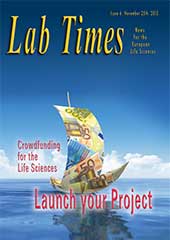 It’s that time of year…
It’s that time of year…
Our friends at The Scientist have once again asked us to compile our top 10 retractions of the year. Check out our “greatest hits” of the year. Continue reading The top 10 retractions of 2015
 It’s that time of year…
It’s that time of year…
Our friends at The Scientist have once again asked us to compile our top 10 retractions of the year. Check out our “greatest hits” of the year. Continue reading The top 10 retractions of 2015
We’re very pleased to announce a new grant for $130,000 from The Leona M. and Harry B. Helmsley Charitable Trust to The Center For Scientific Integrity, our parent non-profit organization.
The generous funding from the Trust’s Biomedical Research Infrastructure Program will allow us to work with a consultant to develop operational and sustainability plans for the Center. Over the coming months, we will assess the current unmet needs within the realm of scientific integrity, develop a strategic business plan that targets those unmet needs, and explore opportunities for growth. While grants will remain a critical part of our budget, we hope to Continue reading Helmsley Trust helps Retraction Watch chart its future with new $130,000 grant
 Benevolent readers: As we’ve noted many times, since August of 2010 when we launched Retraction Watch, you’ve showed us plenty of love, for which we are ever grateful. Your encouragement, story tips, and critiques are what make the site what it is. It’s great to know that we are providing you with a valuable source of information that has helped focus public attention on scientific misconduct and the process of self-correction.
Benevolent readers: As we’ve noted many times, since August of 2010 when we launched Retraction Watch, you’ve showed us plenty of love, for which we are ever grateful. Your encouragement, story tips, and critiques are what make the site what it is. It’s great to know that we are providing you with a valuable source of information that has helped focus public attention on scientific misconduct and the process of self-correction.
Now, on this Giving Tuesday, we’re hoping some of you will consider making tax-deductible charitable contributions to The Center For Scientific Integrity, the 501(c)3 parent organization of Retraction Watch. Please consider supporting our blog financially by becoming a paying subscriber at a modest level (or, if the spirit moves you, at an immodest level — we’ll take that, too!). Continue reading This Giving Tuesday, consider supporting Retraction Watch
 Nearly three years ago, our co-founders Ivan Oransky and Adam Marcus penned a column in Lab Times suggesting ways for readers to report alleged scientific misconduct. They are now retracting that advice.
Nearly three years ago, our co-founders Ivan Oransky and Adam Marcus penned a column in Lab Times suggesting ways for readers to report alleged scientific misconduct. They are now retracting that advice.
In the retracted column, they suggested initially contacting the editor of the journal that published the potentially problematic work, and if the editor suggests it, contact the authors of that work. In their latest column for Lab Times, Oransky and Marcus say: Forget that advice. Continue reading A Retraction Watch retraction: Our 2013 advice on reporting misconduct turns out to have been wrong
 As our readers know, one of the goals of our work at Retraction Watch is to create a free, comprehensive database of retractions. That effort is generously funded by The John D. and Catherine T. MacArthur Foundation and The Laura and John Arnold Foundation.
As our readers know, one of the goals of our work at Retraction Watch is to create a free, comprehensive database of retractions. That effort is generously funded by The John D. and Catherine T. MacArthur Foundation and The Laura and John Arnold Foundation.
Today, we’re excited to announce that our parent organization, The Center For Scientific Integrity (CSI), has partnered with The Center For Open Science (COS) to create that database on the Open Science Framework (OSF).
It’s a natural collaboration, says Retraction Watch co-founder and CSI executive director Ivan Oransky:
Continue reading New Retraction Watch partnership will create retraction database

Thanks to a generous grant, we’re in the enviable position of being able to add a second staff writer. Which means we’re looking for applicants.
The job is not for the faint of heart. It’s definitely fast-paced; our staff writer will be expected to write an average of two posts per day, and feel comfortable dropping the day’s plan to jump on a breaking story. Our writers also contribute to bigger projects such as the feature we wrote for Nature on fake peer reviews.
We’re looking for Continue reading Join our team: Retraction Watch is hiring a second staff writer

Retraction Watch readers, please join us in welcoming the newest member of our staff, Alison Abritis.
To say that Abritis is a good fit for Retraction Watch would be a colossal understatement. Abritis started her PhD in public health at the University of South Florida several years ago, intending to focus on toxicology. But her advisor noticed that every time they met, she would describe problematic papers she was reading. So he suggested that she focus on scientific publishing in her research.
The result was a fascinating dissertation, Continue reading Meet the new Retraction Watch researcher, Alison Abritis
 Five years ago today, we wrote our first post, “Why write a blog about retractions?” And although every year since has been terrific, this year we have the most to celebrate so far. Here are some highlights: Continue reading New $300,000 grant marks the fifth anniversary of Retraction Watch
Five years ago today, we wrote our first post, “Why write a blog about retractions?” And although every year since has been terrific, this year we have the most to celebrate so far. Here are some highlights: Continue reading New $300,000 grant marks the fifth anniversary of Retraction Watch

Retraction Watch readers, please join us in welcoming Shannon Palus to our team.
Palus, who has written for Discover, Slate, The Atlantic, and a host of other publications, joined us last week. She has a B.Sc. in physics, with a minor in anthropology, from McGill, where she worked at The McGill Daily. Since graduating, she’s worked as an intern at Idaho National Lab and as a fact-checker for publications including Popular Science.
It was Palus’s eye as a fact-checker, along with her passion for truth-seeking and digging, that convinced us she was perfect for Retraction Watch. She writes: Continue reading Meet the new Retraction Watch staff writer, Shannon Palus
Ever since we broke the news about the issues with the now-retracted Science paper about changing people’s minds on gay marriage, we’ve been the subject of a lot of press coverage, which has in turn led a number of people to ask us: Who has the most retractions?
Well, we’ve tried to answer that in our new Retraction Watch leaderboard.
Here is the current list (click here for more detailed information about our methodology and additional notes): Continue reading Who has the most retractions? Introducing the Retraction Watch leaderboard